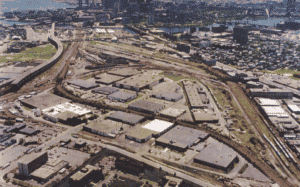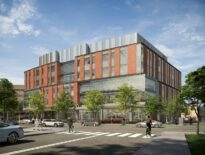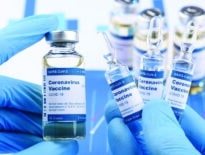
A Somerville planning study estimated that the 100-acre Inner Belt industrial neighborhood could support over 3 million square feet of office and lab development. City of Somerville photo
Somerville’s Inner Belt district checks many of the boxes that are in demand among commercial developers.
Federal opportunity zone? Check. Zoning for lab-ready floor plates? Check. Close to growing life science clusters? Check. Transit-friendly? The MBTA Green Line Extension project is supposed to wrap up in late 2021.
The 100-acre industrial neighborhood is becoming a new frontier for life science expansion in Greater Boston, building off the recent industry growth in Union Square and Cambridge Crossing. A Somerville planning study estimated the neighborhood can accommodate 3.25 million square feet of office-lab space, and the first major project is working through the city review process.
“We’re seeing a really dynamic shift in the market and incredible demand for life sciences,” said Melissa Woods, senior planner for the city of Somerville.
Bounded by Interstate 93 and rail lines, the neighborhood was zoned for industrial use until December 2019, when Somerville city councilors approved a landmark citywide rezoning. As part of the new commercial-industrial district, new buildings in the Inner Belt can be built up to 65-foot heights as-of-right, with maximum floor plates of 50,000 square feet.
The 552-page zoning plan – the city’s first update since 1990 – was designed to make development more predictable and reduce the need for variances, setting a goal of creating 30,000 jobs by encouraging commercial development in high-growth industries.
“There wasn’t a lot of lab development prior to this rezoning,” said Hugh Hahn, a senior project manager for engineering firm VHB. “Lab has been a source of pent-up demand in Somerville, and a lot of projects were waiting for the new zoning to pull the trigger.”
Life science companies are seeking approximately 2 million square feet of research space in Greater Boston, according to local brokerages, prompting developers to expand their horizons into multiple new industry clusters from the Boston Seaport to Waltham.
Boynton Yards, Redux
Near the southern edge of the district at 15 McGrath Highway, Boston-based Leggat McCall Properties and DLJ Properties are seeking approval for a 384,331-square-foot office-lab building to replace a 2-story strip mall. North River Co., a New York developer, has assembled an 8-acre site including four industrial properties on Fitchburg, Chestnut and Joy streets and 150 Inner Belt Road. North River Co. did not return messages seeking details on development plans. And the 184-room Holiday Inn Somerville at 30 Washington St. is on the market, with the 3.3-acre property being touted by JLL marketing materials as having excess land suitable for life science development.
The property is located in a federal Opportunity Zone, which would give the new owner tax incentives if they make improvements or additional development.
While the rezoning does not allow residential uses in the Inner Belt, another developer appears to be moving forward with multifamily housing at a 4.7-acre site which has approvals dating back to March 2019.
Boston-based Paradigm Properties received approval for a 205-unit apartment complex last year, and Texas-based Criterion Development Partners acquired the three-parcel site at 0-20 Inner Belt Road and 56 Roland St. in September for $10.3 million.

Steve Adams
Demand for Inner Belt parcels follows the recent game plan of developers acquiring industrial sites in the nearby Brickbottom neighborhood for life science projects.
In September, Columbia Real Estate Management paid $48 million for a 1.2-acre site on Webster Avenue, Columbia Street and Beach Avenue near the planned Union Square MBTA station. The property, which includes a 252-space parking garage and auto repair shops, will be redeveloped as a life science building, according to JLL Boston.
East Somerville’s proximity to Kendall Square and imminent transit upgrades make the neighborhood a natural fit for life science growth, said Mark Rosenshein, a partner at Boston-based development consultants Trademark Partners.
“All of the easy real estate in the center of [Boston] is gone, so we’re all taking one step further out in the ring,” Rosenshein said.




 |
| 

